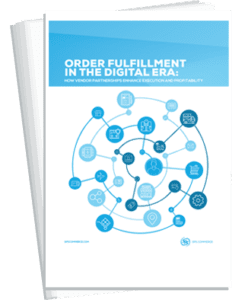How Artificial Intelligence is shaping the retail supply chain
Artificial Intelligence (AI) has rapidly become mainstream––interjecting itself into almost every aspect of our modern, technology-based lives.
The potential of AI to enhance everyday business actions and strategies within the supply chain has been a topic of great interest for a few years now.
Back in 2016, Business Insider predicted that by 2020, as many as 85% of all customer interactions would happen without any human involvement. It seems this predicted future has fully arrived. However, revealing AI’s most significant impacts has been harder to identify.
So, what exactly is AI?
The definitions are varied depending on where you look for them. The term “artificial intelligence” has been around for a while. It was first coined in 1956 by John McCarthy, a computer scientist (known as the father of AI).
According to Merriam-Webster’s definition, Artificial Intelligence is: “A branch of computer science dealing with the simulation of intelligent behavior in computers. The capability of a machine to imitate intelligent human behavior.”
Today, modern definitions focus on AI as a sub-field of computer science and how machines can imitate human intelligence (being human-like rather than becoming human).
Indeed, it seems artificial intelligence has become universal with our modern digital lives. However, the easiest way to understand the potential application of AI is to define its potential from a value-added perspective:
- Augmentation: This type of Artificial Intelligence appears in Virtual Assistant, Data analysis, software solutions to reduce errors due to human bias assists humans in day-to-day activities and tasks, both personally and commercially.
- Automation: In this scenario, AI operates entirely autonomously in any field without the need for any human involvement. For example, robots performing process roles in manufacturing plants.
From an everyday retail consumer experience, AI is what generates the suggestions for additional products when you are purchasing online––when Google somehow intuits what you are searching for.
Bottom line: AI leverages the power and speed of machines to gather data, equate, and analyze it to comprehend and solve problems. This power and speed show up in a variety of applications within the retail supply chain.
Where artificial intelligence adds value to the supply chain
- Inventory management is just one example of where AI acts as the intelligence engine behind the retail process, allowing for more intuitive data management across each touchpoint and turning data into valuable insights.
- Retail analytics uses a variety of data sources to gain a comprehensive view of your business, taking into consideration inventory balances and transactions to determine ideal inventory balance per SKU, optimal replenishment cycles––based on usage and vendor performance/seasonality and stock out reduction.
- Electric Data Interchange (EDI) solutions include intelligence about your trading partners to automate data exchange and, when needed, automate data with your business system(s) of records such as eCommerce, ERP, shipping, or other system using APIs.
- Autonomous mobile robots (AMR) are being used in more significant numbers in warehouses to automate fulfillment. AMRs can circumnavigate obstacles and use “simultaneous localization and mapping (SLAM)” to build and update maps of the environment in which they work.
- Conversational AI applies a customer-first approach to AI. In this application, AI utilizes natural language processing to narrow, contextualize, and improve search results for online shoppers.
AI is a journey. The first step is essential.
The magnitude of information that passes through the retail supply chain often makes it difficult for leaders to discern problems before they affect the business.
Most supply chain issues start small, making them easier to miss––delayed payments or documents, missed inspections, logistical weather issues.
All of these things can add up to significant service-level agreement penalties and unhappy customers. However, success in one area tends to clarify other aspects of your supply chain that might benefit from AI.
Successfully integrating AI into your supply chain
An excellent way to try AI out is by identifying a specific small-scale supply chain test as a starting point and then committing a pilot project to address that specific problem. Tracking documents and data can help you understand what’s happening across your supply chain.
AI can analyze vast quantities and diverse types of data in real-time, identify repetitions, potential issues, and suggest insights to speed resolution.
AI can make technical information more accessible for business users, easier to comprehend and use to increase efficiency, and better serve your customers. Automated AI-enabled insights can help you increase end-to-end supply chain visibility so that you can act quicker with greater certainty now and into the future.
Are you looking to automate your supply chain for greater efficiency in the coming year? We can help.
If you are interested in learning more about our retail automation products and how they complement the entire length of the retail supply chain, visit our retail page. If you’ve already got enough information, ask to speak to one of our retail specialists for a free demonstration of how our products can help you bring greater intelligence and reliability to your processes.

Order fulfillment is more complex in an omnichannel environment.
Enlist the help of your trading partners to profitably satisfy today’s consumer. Download our white paper to help you strategize your action plan.
- SPS Commerce Named #1 IT Infrastructure Software by G2 - February 25, 2025
- Optimizing RTV: The key to smarter supply chain management - January 6, 2025
- E-invoicing: all the basics you need to know - December 16, 2024

RELATED POSTS
Save big money with order automation
Three takeaways from SuiteWorld 2024
Acumatica Summit 2024: A recap